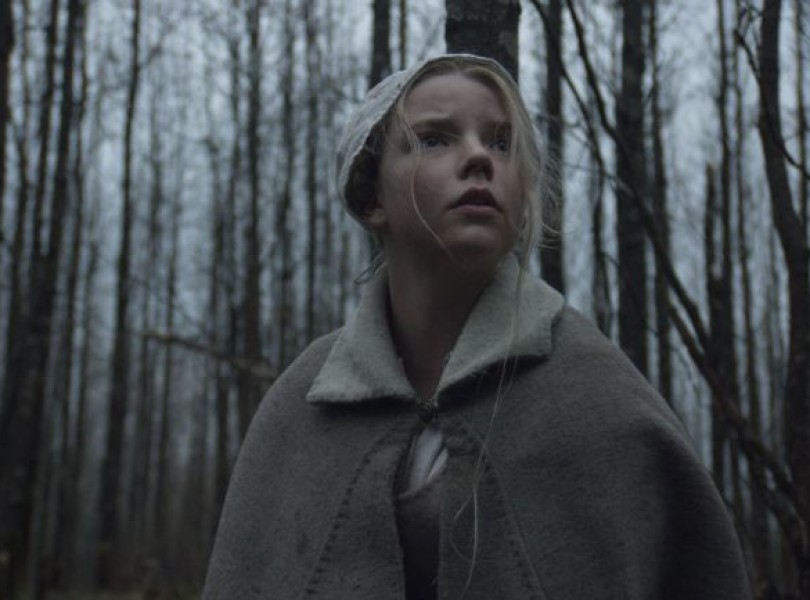Horror is where the hearth is.
Writer-director Robert Eggers’ debut feature, The Witch, is a film that immediately transports the viewer to a strange and unsettling alien world: New England of the year 1630, where a Puritan family struggles to survive — and stay together — in the face of the brutal wilderness and mysterious, evil forces that surround their lonely, isolated farm.
But there’s more at work in this film than the tried and true horror notion of what lurks beyond, and it’s that chord of religious fanaticism and familial disintegration that really sticks with you long after the closing credits have rolled.
We want to hear it.
The father of the family is William (Ralph Ineson of Game of Thrones, Harry Potter and The Office), a devout man of faith whose belief system is apparently too extreme even for his fellow Puritan colonists. As such, William and his wife and children are expelled from the colony, and head out alone into the unknown with all of their worldly possessions strapped to an unwieldy wagon. They eventually find a plot of land on the edge of a forest, but as Eggers’ camera trains ominously on a single tree at the tip of the woods, it’s abundantly clear that this is not prime real estate at all.
Newcomer Anya Taylor-Joy stars as Thomasin, the eldest daughter who is caught between the needs of her family, her status as a girl on the verge of womanhood, and the extremely unwise and precarious situation her father has put them all in. While playing peek-a-boo in the field with her infant brother, the child suddenly disappears. We see a figure running off with the child in the woods, but the more startling image may be that very game of peek-a-boo, where Eggers puts us in the place of the baby momentarily as Taylor-Joy’s face hangs over us. It’s an odd thing, because Thomasin clearly loves her brother and is playing with him, but every time she uncovered her eyes and yelled “boo” I recoiled a bit.
The family doesn’t know who took the child, however, and this is the first blow of many for the clan. Thomasin isn’t accused outright, not at first anyway, of being responsible for the loss of the baby, but as things grow dire for the family she increasingly becomes a target of her mother’s (a creepy and fragile Kate Dickie, who also played the creepy and fragile Lysa Arryn on Game of Thrones) and her younger twin siblings’, who begin hurling accusations that she’s a witch.
Thomasin’s other brother is Caleb (Harvey Scrimshaw), who’s closer in age to her than the twins and beginning to feel the stirrings that any young teenage boy would. Of course, living alone with his family and with no other girls close to his age around (beyond Thomasin) isn’t an ideal situation, and this only adds another bit of unsettling texture to the dynamic of this household. Caleb eventually finds himself in the woods as well, which results in an amazing scene for the young Scrimshaw that has got to get the kid more work.
But it’s Taylor-Joy’s movie, as Thomasin tries to keep her family together even while all points lead to its complete and utter collapse. We can see that she is an innocent young girl who only means well, but are the twins right about her? Why is nature so ill at ease around her, anyway? Images of blood coming from a goat’s udder that she’s trying to milk, or a dead baby bird inside a cracked egg she’s handling, are haunting. Meanwhile, the film’s use of sound effects at times shocks the viewer into a sense of unease.
Some audiences may find the dialogue of the film challenging, as Thomasin and company speak in something approaching an authentic (one supposes) early 1600s New England Puritan dialect. The result adds to the otherworldly and off-putting feel of the drama, but it’s not a surprise that not a ton of that lingo has been included in the promotion for The Witch. Similarly, those looking for more conventional horror scares may not find what they’re looking for in this moody, creepy tale.
We want to hear it.
While all the performances in the film are notable, from the little ones to the parents and right on up through “Black Phillip” — the family goat who may or may not be in tune with the dark forces surrounding the family — Taylor-Joy stands out as the young, terrified girl who despite her best efforts faces the inexorable pull of madness that those around her exerting. Really, it began even before their move to the border of the dark woods, with a pressure to be righteous and pure and true to God that is so great that it seems virtually impossible to meet. The Witch has its fair share of witchcraft, but that’s not the only horror at play here.
Robert Eggers (who won a directing award at Sundance last year for this film) makes his mark with The Witch, a remarkable tale of fear and horror that also serves as a very disturbing coming of age story. Anya Taylor-Joy also mesmerizes as the girl torn between her crumbling family and survival.




